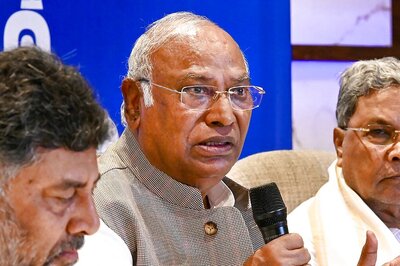
views
‘She is the lady Singham of Delhi’ — This is how Aam Aadmi Party (AAP) boss and Delhi Chief Minister Arvind Kejriwal had once described Swati Maliwal at a function organised by the Delhi Women’s Commission to honour survivors of violence in the capital.
It was high praise for the young DCW chief who stormed the albeit toothless body, using every power at her disposal to address the hydra-headed issues that women face on a day-to-day basis.
Bold, outspoken, hardworking with a penchant for grabbing attention and courting controversy, the 40-year-old activist is in the news again after being nominated by AAP’s political affairs committee to the Upper House. She becomes the first and only woman who will enter the Rajya Sabha from the party.
Maliwal’s biggest strength is perhaps the faith that the AAP boss has reposed in her. In the winter of 2012, the brutal gang rape and fatal assault of 23-year-old Jyoti Singh triggered massive outrage, forcing the then Sheila Dixit-ruled government in Delhi and the UPA government at the Centre, to go on the back foot.
Dixit’s assertion that Delhi Police was not under her control did not win her any support. As the protests swelled, the newly formed AAP took to the streets, with Kejriwal, Sisodia and others protesting along with thousands of citizens on Rajpath. Swati, then 28, was also on the streets, braving the lathis of the police, the freezing temperatures and screaming her lungs out, demanding justice for Jyoti and safety for women.

When AAP formed the government in Delhi in 2015 with a massive majority, winning 67 of 70 seats, nothing much had changed.
Delhi Police was still under the control of the central government, now ruled by BJP-led NDA. And the Capital had not become any safer for women. Kejriwal had promised that he would make Delhi a safe city which, he had claimed, his predecessor had failed to do. So, while he focused on measures like installation of CCTV cameras, appointing bus marshals etc, he also appointed Maliwal as the chairperson of the Delhi Commission for Women.
And it is here that Maliwal shone with her incessant pursuit of accountability and justice. During her two terms in DCW, she handled more than 1,70,000 complaints and galvanised the office like never before.
An IT graduate from the JSS Academy of Technical Education, Maliwal plunged into activism when she joined Kejriwal-led NGO Parivartan, which was then working in the slums of Delhi and trying to ensure that the benefits of welfare schemes actually reach people.
Kejriwal would go on to win the prestigious Magasasay Award and as his work expanded, Maliwal stuck to the work in the NGO. It is here that she met Manish Sisodia who had quit his TV career to become an activist and who would later go on to become the deputy chief minister of Delhi.
A crucial turning point in Maliwal’s life was when the Anna Hazare campaign split into two, with one side opting for politics while the other preferring the form of activism.
Part of the core team of the Anna Hazare movement, and more of a ‘people’s movement’ person, the idealistic Maliwal was disappointed the day Kejriwal announced at Jantar Mantar that a political party would be formed. And though she remained a part of Kejriwal’s core group because of her long association, she took her time before plunging into politics. While many of her contemporaries were offered tickets or given charge of handling crucial responsibilities, when AAP contested elections for the first time in 2013, Maliwal was not one of them.
Born on October 15, 1984, in Ghaziabad, Uttar Pradesh, Maliwal pursued her early education at the Amity International School. In her affidavit, she has stated that she is the daughter of Sangita Maliwal, her mother, preferring to omit her father’s name. Maliwal created a flutter in 2023 when she alleged that as a child, she was sexually abused by her father, an ex-service man, and that she used to be so scared of him that she would hide under the bed. Incidentally, her father had already passed away when Maliwal made the shocking claim.

Her association with Naveen Jaihind predates the Anna Hazare movement. After a brief romance, in tune with the ‘krantikari’ mood of those days, the two got married on January 23, 2012, on Netaji Subhas Chandra Bose’s birth anniversary. However, barely eight years later, Maliwal took to Twitter to announce her divorce from Jaihind. While domestic abuse was stated to be reason, which was contested by Jaihind who was then with the AAP, Maliwal was open about her marriage falling apart, unafraid of the dreaded ‘divorcee’ tag.
When Maliwal was appointed as chairperson of the Delhi Women’s Commission, she was barely 31 years old. However, her young age proved to be her greatest asset, as she infused youthful energy and hope into the role.
From not shying away from issuing a notice to the Delhi police commissioner, establishing a helpline for women, rescuing and rehabilitating victims of trafficking, domestic violence, child labour, illegal confinement, to promptly addressing grievances and providing counsel, Maliwal was no pushover.
In her capacity as DCW chairperson, Maliwal sat on a 10-day fast in 2018, demanding death penalty for rape convicts, Following another brutal rape in the Capital, she went on another 13-day fast, demanding greater accountability from the system. These fasts did not generate much interest either in the media or even within the AAP but it did demonstrate Maliwal’s resilience.
In 2023, she was one of the first leaders to visit violence-torn Manipur and speak to the victims. As DCW chairperson, she did not have any locus in Manipur. However, that did not prevent her from traveling alone to the state. She has been conspicuous in lending support to other highly publicised stories like the Unnao rape case or the wrestlers’ protest.
However, Maliwal has also been criticised for her penchant for drama.
Last year, during New Year, in a bid to ‘inspect’ conditions of women’s safety at night, Maliwal stepped out on the road alone and had a close brush with a drunken driver. This overreach on her part, as in many other instances, was deemed unnecessary and a call to drama, not action. Her critics labelled her with the sobriquet of a ‘drama queen’.
It is such cases where Maliwal has to put in more thought before acting as she transitions from her role as an activist to that of a politician. As her party’s sole woman representative in the Upper House of Parliament, she carries enormous responsibility and hope.




















Comments
0 comment